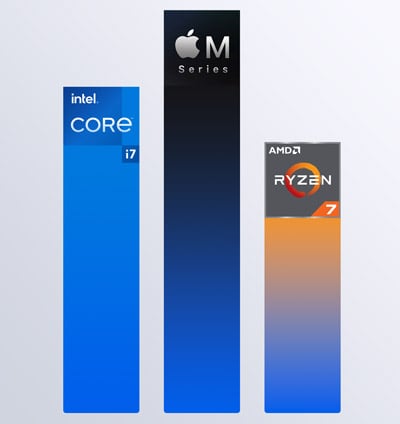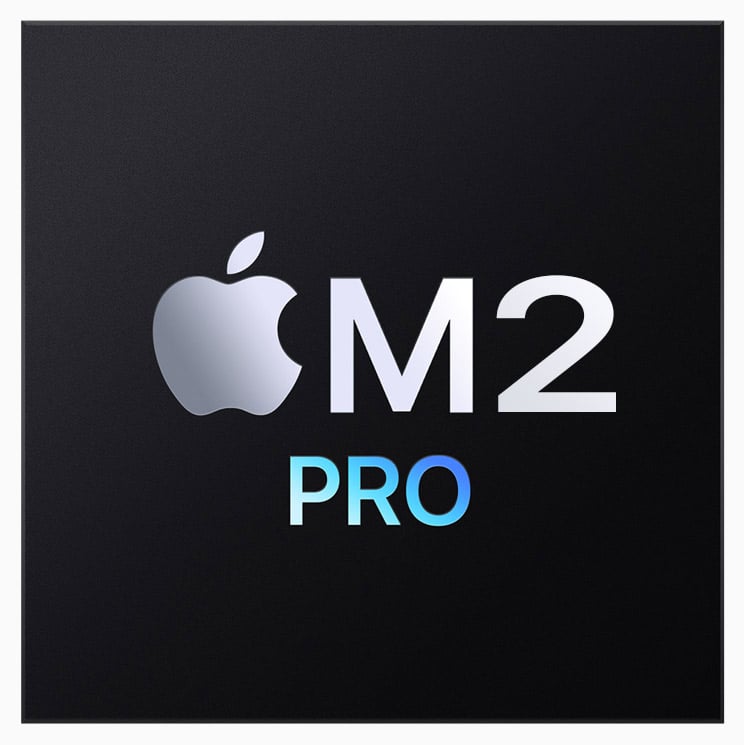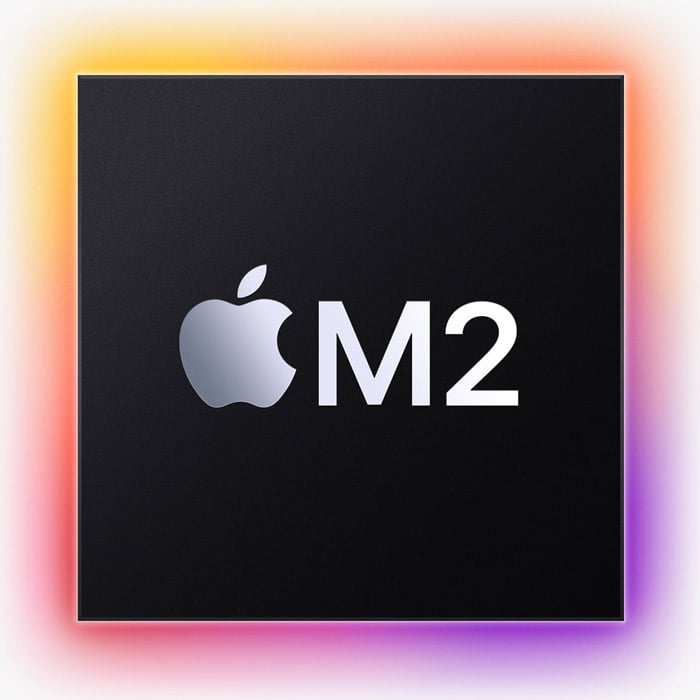
Apple M2 Benchmark, Test and specs
Last updated:
The Apple M2 has 8 CPU cores and can process 8 threads at the same time. The processor was presented in Q2/2022 and is based on the 2. Generation of the Apple M series series. In the Geekbench 5 benchmark, the Apple M2 achieved a result of 1,874 points (single-core) or 8,853 points (multi-core).

| Name: | Apple M2 |
|---|---|
| Family: | Apple M series (23) |
| CPU group: | Apple M2 (8) |
| Architecture: | M2 |
| Segment: | Mobile |
| Generation: | 2 |
| Predecessor: | Apple M1 |
| Successor: | Apple M3 |
CPU Cores and Base Frequency
The Apple M2 has 8 cores. The clock frequency of the Apple M2 is 0.66 GHz (3.50 GHz). An initial performance assessment can be made using the number of CPU cores.
| CPU Cores / Threads: | 8 / 8 |
|---|---|
| Core architecture: | hybrid (big.LITTLE) |
| A-Core: | 4x Avalanche |
| B-Core: | 4x Blizzard |
| Hyperthreading / SMT: | No |
|---|---|
| Overclocking: | No |
| A-Core Frequency: | 0.66 GHz (3.50 GHz) |
| B-Core Frequency: | 0.60 GHz (2.42 GHz) |
Artificial Intelligence and Machine Learning
Processors with the support of artificial intelligence (AI) and machine learning (ML) can process many calculations, especially audio, image and video processing, much faster than classic processors. Algorithms for ML improve their performance the more data they have collected via software. ML tasks can be processed up to 10,000 times faster than with a classic processor.
| AI hardware: | Apple Neural Engine |
|---|---|
| AI specifications: | 16 Neural cores @ 15.8 TOPS |
Internal Graphics
The Apple M2 has an integrated graphics that the system can use to efficiently play back videos. The Apple M2 has the Apple M2 (10 Core) installed, which has 160 streaming multiprocessors (1280 shaders).
| GPU name: | Apple M2 (10 Core) |
|---|---|
| GPU frequency: | 0.45 GHz |
| GPU (Turbo): | 1.40 GHz |
| Compute units: | 160 |
| Shader: | 1280 |
| Hardware Raytracing: | No |
| Release date: | Q2/2022 |
| Max. displays: | 2 |
|---|---|
| Generation: | 2 |
| Direct X: | -- |
| Technology: | 5 nm |
| Max. GPU Memory: | 24 GB |
| Frame Generation: | No |
Hardware codec support
Processors with integrated graphics can process video codecs faster. Support for modern codecs can significantly increase system efficiency during video playback.
| h265 / HEVC (8 bit): | Decode / Encode |
|---|---|
| h265 / HEVC (10 bit): | Decode / Encode |
| h264: | Decode / Encode |
| VP8: | Decode |
| VP9: | Decode / Encode |
| AV1: | No |
|---|---|
| AVC: | Decode |
| VC-1: | Decode |
| JPEG: | Decode / Encode |
Memory & PCIeThe Apple M2 supports a maximum of 24 GB memory. Depending on the mainboard, the processor can use a maximum of 2 (Dual Channel) memory channels. This results in a maximum bandwidth of the main memory of 102.4 GB/s. |
|
| Memory type: | Memory bandwidth: |
|---|---|
| LPDDR5-6400 | 102.4 GB/s |
| Max. Memory: | 24 GB |
| Memory channels: | 2 (Dual Channel) |
| ECC: | No |
| PCIe: | 4.0 |
| PCIe Bandwidth: | -- |
Thermal ManagementThe Apple M2 has a TDP of 20 W. Based on the TDP, the system manufacturer can and must adapt the cooling solution to the processor. |
|
|---|---|
| TDP (PL1 / PBP): | 20 W |
| TDP (PL2): | -- |
| TDP up: | 30 W |
| TDP down: | 10 W |
| Tjunction max.: | 100 °C |
Technical details
Modern production reduces the waste heat of a processor and increases its efficiency. The Apple M2 is made in 5 nm and has 20.00 MB cache.
| Technology: | 5 nm |
|---|---|
| Chip design: | Chiplet |
| Socket: | -- |
| L2-Cache: | 20.00 MB |
| L3-Cache: | -- |
| AES-NI: | Yes |
| Operating systems: | macOS, iPadOS |
| Virtualization: | Apple Virtualization Framework |
|---|---|
| Instruction set (ISA): | Armv8.5-A (64 bit) |
| ISA extensions: | Rosetta 2 x86-Emulation |
| Release date: | Q2/2022 |
| Release price: | -- |
| Part Number: | -- |
| Documents: | Technical data sheet |
Rate this processor
Benchmark results

The benchmark results for the Apple M2 have been carefully checked by us. We only publish benchmark results that have been created by us or that have been submitted by a visitor and then checked by a team member. All results are based on and fullfill our benchmark guidelines.
Screenshots:
Screenshots:
- Geekbench 5.4.5 (8 GB LPDDR5-6400), macOS 12.4
- Geekbench 6.1.0 on Apple MacBook Air (2022) (8 GB LPDDR5-6400), macOS 13.5
- Cinebench R23 on Apple MacBook Air (2022) (8 GB LPDDR5-6400), macOS 13.5
- Cinebench 2024 on Apple MacBook Air (2022) (8 GB LPDDR5-6400), macOS 13.5
- Apple Powermetrics on Apple MacBook Air 14 (2022) (8 GB LPDDR5-6400), macOS 13.5
Cinebench 2024 (Single-Core)
The Cinebench 2024 benchmark is based on the Redshift rendering engine, which is also used in Maxon's 3D program Cinema 4D. The benchmark runs are each 10 minutes long to test whether the processor is limited by its heat generation.

|
Apple M2 Max (38-GPU)
12C 12T @ 3.50 GHz |
||

|
Intel Core i9-13900
24C 32T @ 5.60 GHz |
||

|
Intel Core i9-13900F
24C 32T @ 5.60 GHz |
||
|
|
Apple M2
8C 8T @ 3.50 GHz |
||

|
Apple M2 (8-GPU)
8C 8T @ 3.50 GHz |
||

|
AMD Ryzen Threadripper 7970X
32C 64T @ 5.30 GHz |
||

|
AMD Ryzen 7 7700X
8C 16T @ 5.40 GHz |
||
Cinebench 2024 (Multi-Core)
The Multi-Core test of the Cinebench 2024 benchmark uses all cpu cores to render using the Redshift rendering engine, which is also used in Maxons Cinema 4D. The benchmark run is 10 minutes long to test whether the processor is limited by its heat generation.

|
AMD Ryzen 5 3600
6C 12T @ 4.20 GHz |
||

|
AMD Ryzen 5 5600H
6C 12T @ 4.20 GHz |
||

|
AMD Ryzen 5 5600HS
6C 12T @ 4.20 GHz |
||
|
|
Apple M2
8C 8T @ 3.50 GHz |
||

|
Apple M2 (8-GPU)
8C 8T @ 3.50 GHz |
||

|
Intel Core i5-12500H
12C 16T @ 4.50 GHz |
||

|
AMD Ryzen 7 1800X
8C 16T @ 4.00 GHz |
||
Cinebench R23 (Single-Core)
Cinebench R23 is the successor of Cinebench R20 and is also based on the Cinema 4 Suite. Cinema 4 is a worldwide used software to create 3D forms. The single-core test only uses one CPU core, the amount of cores or hyperthreading ability doesn't count.

|
AMD Ryzen 7 PRO 6860Z
8C 16T @ 4.73 GHz |
||

|
AMD Ryzen 5 5600X
6C 12T @ 4.60 GHz |
||

|
AMD Ryzen 7 5800
8C 16T @ 4.60 GHz |
||
|
|
Apple M2
8C 8T @ 3.50 GHz |
||

|
Apple M2 (8-GPU)
8C 8T @ 3.50 GHz |
||

|
AMD Ryzen 7 PRO 6850U
8C 16T @ 4.70 GHz |
||

|
AMD Ryzen 9 6900HS
8C 16T @ 4.60 GHz |
||
Cinebench R23 (Multi-Core)
Cinebench R23 is the successor of Cinebench R20 and is also based on the Cinema 4 Suite. Cinema 4 is a worldwide used software to create 3D forms. The multi-core test involves all CPU cores and taks a big advantage of hyperthreading.

|
AMD Ryzen 7 1700X
8C 16T @ 3.60 GHz |
||

|
AMD Ryzen 5 4600HS
6C 12T @ 4.00 GHz |
||

|
Intel Core i9-9880H
8C 16T @ 3.40 GHz |
||
|
|
Apple M2
8C 8T @ 3.50 GHz |
||

|
Apple M2 (8-GPU)
8C 8T @ 3.50 GHz |
||

|
Intel Core i7-9700F
8C 8T @ 3.80 GHz |
||

|
Intel Core i7-9700
8C 8T @ 3.80 GHz |
||
Geekbench 5, 64bit (Single-Core)
Geekbench 5 is a cross plattform benchmark that heavily uses the systems memory. A fast memory will push the result a lot. The single-core test only uses one CPU core, the amount of cores or hyperthreading ability doesn't count.

|
Intel Core i9-11900K
8C 16T @ 5.30 GHz |
||

|
Intel Core i9-11900KF
8C 16T @ 5.30 GHz |
||

|
Intel Core i5-14500
14C 20T @ 5.00 GHz |
||
|
|
Apple M2
8C 8T @ 3.50 GHz |
||

|
Apple M2 Max (30-GPU)
12C 12T @ 3.50 GHz |
||

|
Apple M2 Pro (10-CPU 16-GPU)
10C 10T @ 3.50 GHz |
||

|
Apple M2 Max (38-GPU)
12C 12T @ 3.50 GHz |
||
Geekbench 5, 64bit (Multi-Core)
Geekbench 5 is a cross plattform benchmark that heavily uses the systems memory. A fast memory will push the result a lot. The multi-core test involves all CPU cores and taks a big advantage of hyperthreading.

|
AMD Ryzen 7 PRO 6860Z
8C 16T @ 2.70 GHz |
||

|
AMD EPYC 7301
16C 32T @ 2.70 GHz |
||

|
Intel Xeon Gold 5117
14C 28T @ 2.40 GHz |
||
|
|
Apple M2
8C 8T @ 3.50 GHz |
||

|
AMD Ryzen 5 PRO 8640U
6C 12T @ 3.50 GHz |
||

|
AMD Ryzen 5 8640U
6C 12T @ 3.50 GHz |
||

|
AMD Ryzen 5 PRO 7640U
6C 12T @ 3.50 GHz |
||
Geekbench 6 (Single-Core)
Geekbench 6 is a benchmark for modern computers, notebooks and smartphones. What is new is an optimized utilization of newer CPU architectures, e.g. based on the big.LITTLE concept and combining CPU cores of different sizes. The single-core benchmark only evaluates the performance of the fastest CPU core, the number of CPU cores in a processor is irrelevant here.

|
Intel Core i9-12900E
16C 24T @ 5.00 GHz |
||

|
Intel Core i9-13900E
24C 32T @ 5.20 GHz |
||

|
AMD Ryzen Threadripper PRO 7985WX
64C 128T @ 5.10 GHz |
||
|
|
Apple M2
8C 8T @ 3.50 GHz |
||

|
Apple M2 (8-GPU)
8C 8T @ 3.50 GHz |
||

|
Intel Core i5-14500T
14C 20T @ 4.80 GHz |
||

|
Intel Core i9-12900K
16C 24T @ 5.20 GHz |
||
Geekbench 6 (Multi-Core)
Geekbench 6 is a benchmark for modern computers, notebooks and smartphones. What is new is an optimized utilization of newer CPU architectures, e.g. based on the big.LITTLE concept and combining CPU cores of different sizes. The multi-core benchmark evaluates the performance of all of the processor's CPU cores. Virtual thread improvements such as AMD SMT or Intel's Hyper-Threading have a positive impact on the benchmark result.

|
AMD Ryzen 7 6800H
8C 16T @ 3.80 GHz |
||

|
Intel Xeon W-2255
10C 20T @ 4.40 GHz |
||

|
Intel Core i7-1370P
14C 20T @ 1.90 GHz |
||
|
|
Apple M2
8C 8T @ 3.50 GHz |
||

|
Apple M2 (8-GPU)
8C 8T @ 3.50 GHz |
||

|
Intel Core i7-11700B
8C 16T @ 4.00 GHz |
||

|
Intel Core i9-11900F
8C 16T @ 3.80 GHz |
||
iGPU - FP32 Performance (Single-precision GFLOPS)
The theoretical computing performance of the internal graphics unit of the processor with simple accuracy (32 bit) in GFLOPS. GFLOPS indicates how many billion floating point operations the iGPU can perform per second.

|
AMD Ryzen 9 6900HX
AMD Radeon 680M @ 2.40 GHz |
||

|
Intel Core i7-8709G
AMD Radeon RX Vega M GH @ 1.19 GHz |
||

|
Intel Core i7-8809G
AMD Radeon RX Vega M GH @ 1.19 GHz |
||
|
|
Apple M2
Apple M2 (10 Core) @ 1.40 GHz |
||

|
Apple M3
Apple M3 (10 Core) @ 1.40 GHz |
||

|
AMD Ryzen 7 7735HS
AMD Radeon 680M @ 2.20 GHz |
||

|
AMD Ryzen 7 7736U
AMD Radeon 680M @ 2.20 GHz |
||
Estimated results for PassMark CPU Mark
Some of the CPUs listed below have been benchmarked by CPU-monkey. However the majority of CPUs have not been tested and the results have been estimated by a CPU-monkey’s secret proprietary formula. As such they do not accurately reflect the actual Passmark CPU mark values and are not endorsed by PassMark Software Pty Ltd.

|
AMD Ryzen 7 PRO 1700X
8C 16T @ 3.60 GHz |
||

|
Intel Xeon Gold 5215
10C 20T @ 2.50 GHz |
||

|
Intel Xeon D-1726
6C 12T @ 3.30 GHz |
||
|
|
Apple M2
8C 8T @ 3.50 GHz |
||

|
Apple M2 (8-GPU)
8C 8T @ 3.50 GHz |
||

|
AMD Ryzen 5 5600U
6C 12T @ 3.60 GHz |
||

|
Intel Xeon Gold 5217
8C 16T @ 3.50 GHz |
||
Blender 2.81 (bmw27)
Blender is a free 3D graphics software for rendering (creating) 3D bodies, which can also be textured and animated in the software. The Blender benchmark creates predefined scenes and measures the time (s) required for the entire scene. The shorter the time required, the better. We selected bmw27 as the benchmark scene.

|
Intel Core i9-9880H
8C 16T @ 3.40 GHz |
||

|
Intel Core i9-9980HK
8C 16T @ 3.40 GHz |
||

|
Intel Core i7-5960X
8C 16T @ 3.20 GHz |
||
|
|
Apple M2
8C 8T @ 3.50 GHz |
||

|
Apple M2 (8-GPU)
8C 8T @ 3.50 GHz |
||

|
AMD Ryzen 5 2600X
6C 12T @ 4.00 GHz |
||

|
Intel Core i7-6850K
6C 12T @ 3.60 GHz |
||
CPU performance per watt (efficiency)
Efficiency of the processor under full load in the Cinebench R23 (multi-core) benchmark. The benchmark result is divided by the average energy required (CPU package power in watts). The higher the value, the more efficient the CPU is under full load.

|
AMD Ryzen 5 PRO 8640U
10,675 CB R23 MC @ 24 W |
||

|
Apple M1
7,759 CB R23 MC @ 18 W |
||

|
Apple M1 (7-GPU)
7,759 CB R23 MC @ 18 W |
||
|
|
Apple M2
8,558 CB R23 MC @ 20 W |
||

|
Apple M2 (8-GPU)
8,558 CB R23 MC @ 20 W |
||

|
Apple M3 Max (16-CPU 40-GPU)
24,028 CB R23 MC @ 57 W |
||

|
Apple M2 Pro (10-CPU 16-GPU)
12,125 CB R23 MC @ 30 W |
||
Performance for Artificial Intelligence (AI) and Machine Learning (ML)
Processors with the support of artificial intelligence (AI) and machine learning (ML) can process many calculations, especially audio, image and video processing, much faster than classic processors. The performance is given in the number (trillions) of arithmetic operations per second (TOPS).

|
Apple A15 Bionic (4-GPU)
6C 6T @ 3.23 GHz |
||

|
Apple A15 Bionic (5-GPU)
6C 6T @ 3.23 GHz |
||

|
Apple M2 (8-GPU)
8C 8T @ 0.66 GHz |
||
|
|
Apple M2
8C 8T @ 0.66 GHz |
||

|
Qualcomm Snapdragon 870
8C 8T @ 3.20 GHz |
||

|
Samsung Exynos 990
8C 8T @ 2.73 GHz |
||

|
Qualcomm Snapdragon 865+
8C 8T @ 3.10 GHz |
||
Benchmarks

Cinebench 2024 (SC)
272 entries
272 entries

Cinebench 2024 (MC)
271 entries
271 entries

Cinebench R23 (SC)
586 entries
586 entries

Cinebench R23 (MC)
565 entries
565 entries

Geekbench 5 (SC)
2,488 entries
2,488 entries

Geekbench 5 (MC)
2,461 entries
2,461 entries

Geekbench 6 (SC)
1,755 entries
1,755 entries

Geekbench 6 (MC)
1,703 entries
1,703 entries

FP32 SP (iGPU)
2,039 entries
2,039 entries

PassMark CPU-Mark
2,392 entries
2,392 entries

Blender 2.81 (bmw27)
190 entries
190 entries

CPU performance per watt (efficiency)
109 entries
109 entries

AI / ML Performance
116 entries
116 entries
News and articles for the Apple M2

Most popular processors in the first half of 2022
Posted by Stefan on 2022-07-05
In the past we had repeatedly written about our most popular processors. Since this format was quiet popular, I would like to continue this today and introduce you the most popular processors in the first half of 2022.
With more than 2 million page views per month, CPU-Monkey is one of the biggest comparison sites for processors and is currently available in 16 languages.
With more than 2 million page views per month, CPU-Monkey is one of the biggest comparison sites for processors and is currently available in 16 languages.

Apple M2 Pro with more CPU cores and production in 3 nm ?
Posted by Stefan on 2022-06-28
After Apple surprisingly presented the normal Apple M2 processor as the first successor to the Apple M1 already in June 2022, the Apple M2 Pro and the Apple M2 Max may follow in autumn. The difference in performance compared to the basic version could be even greater this time and range from 25 to 40 percent.
In this article we describe how Apple could realize this and why the price should also go up.
In this article we describe how Apple could realize this and why the price should also go up.

Apple M2 vs Apple M1 - What are the differences?
Posted by Stefan on 2022-06-09
During WWDC 2022 on June 6th, 2022 Apple surprisingly presented its new Apple M2 processor. This will initially be installed in a completely revised Apple MacBook Air with 13.6 inches, a even thinner form factor and new colors. Apple also updated the already known (old) Apple MacBook Pro 13.3 with touch bar.
Many leakers had counted on Apple not presenting its new second-generation M processor until the fall. But things turned out differently. And there is very likely a reason for that: the improvements in the Apple M2 are limited compared to the predecessor.
Many leakers had counted on Apple not presenting its new second-generation M processor until the fall. But things turned out differently. And there is very likely a reason for that: the improvements in the Apple M2 are limited compared to the predecessor.
Description of the processor
The Apple M2 is the further development of the Apple M1 processor. It was announced by Apple in Q2 2022 and shipped first in Q3 2022. The Apple M2 has been slightly improved compared to the Apple M1, mainly the clock frequencies have been increased, the L2 cache has been enlarged and a faster memory is used.The Apple M2 relies on an identical chip layout, which again consists of 4 fast performance cores and 4 efficient CPU cores. Apparently, the processor is again manufactured in 5 nm, but the refreshed TSMC N4P process is probably already being used. According to the Taiwan manufacturer, this should be about 11 percent more powerful or 20 percent more efficient.
The clock frequency of the processor is now 3.5 GHz, which is an increase of 300 MHz compared to the Apple M1. The integrated graphics (iGPU) of the Apple M2 will receive a major upgrade. This now has 10 GPU cores and 160 SM processors. The Apple M1 has 8 GPU cores and 128 SM processors. In addition, Apple has increased the clock frequency of the integrated graphics by 100 MHz to 1.4 GHz.
The Apple M2 processor now uses LPDDR5-6400 memory. Above all, the memory bandwidth and thus the iGPU benefit from this. The processor now maxes out at 102 GB per second, while the Apple M1 with LPDDR4X-4266 memory only manages 68 GB per second. This is a decent improvement that is particularly noticeable in graphics-intensive work.
With the Apple M2, the manufacturer from Cupertino has another interesting mobile processor on offer that has high performance and doesnt make it easy for the competitors AMD and Intel. The processor is very efficient and has its own AI interface to speed up image and video processing.
Popular comparisons
back to index




